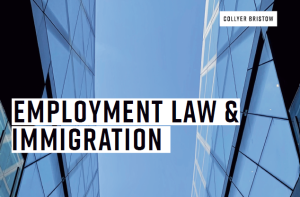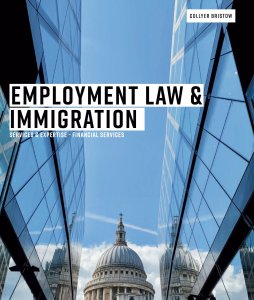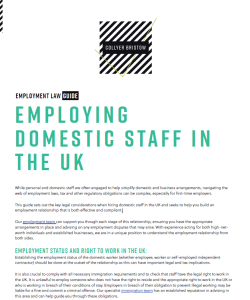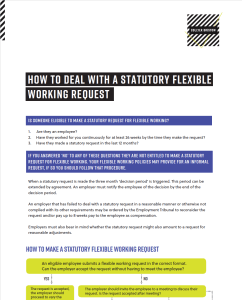
The Team
Our lawyers have the expertise and experience to provide you with creative, personalised solutions in a clear and understandable way.
Our Publications
Discover a wealth of invaluable guidance in the form of guides and brochures written by our expert lawyers.
A tool for Employers
Helping employers manage statutory flexible working requests
About
Flexible working is the future of the workplace.
Despite the lockdowns and restrictions placing unprecedented demands on both employers and employees, many have adapted very well and are now looking to continue with a more hybrid working model, despite the end of the restrictions.
As well as the obvious benefits to both employers and employees of continuing to combine working from home with going into the office and more flexible hours, there are employment law and other legal implications that employers will need to consider.
Each organisation’s requirements will be slightly different and Collyer Bristow’s employment team can work with you to ensure that you have the relevant policies and procedures in place to avoid any pitfalls. Unlike other law firms we do not offer a ‘one-size-fits-all’ Hybrid working package but can provide you with bespoke guidance that suits your specific needs, including:
- Managing requests for flexible working and managing a remote workforce.
- Guidance on how to implement changes to employment contracts in ways that minimise litigation risk.
- How to avoid redundancies and practical methods to reduce expenditure, and how to manage redundancies and restructures which are unavoidable.
- Handling sickness and unauthorised absences, and the effects of ‘long Covid’ on your workforce.
- Data protection issues, particularly around monitoring and recording vaccination status, testing results and sickness.
- Key managerial training including managing internal procedures whilst still working remotely, and dealing with inter-staff conflicts.
A reform of flexible working regulations
On 23 September the government opened a consultation to take views from individuals and businesses on its proposals to reform flexible working regulations. The government is consulting on five proposals which generally are designed to make flexible working the default for most. The consultation closed on 01 December 2021. The government states it is still analysing responses and is yet to publish its findings. It’s therefore not likely that any changes will be introduced for some time.
Meanwhile, the existing flexible working regulations remain in force, and businesses are being encouraged by the government to accept flexible working.
Employee expectations to work flexible and agilely have exploded and nearly half of all employers are reported to offer flexible working in 2021.
Support for employees
We advise employees on how to make statutory requests for flexible working and what your rights are if your employer unreasonably refuses a request or doesn’t respond within the decision period.
We can assist with preparing a formal request; guide you through the process; and where requests are not accepted by employers, assist you with submitting an appeal, grievance or Employment Tribunal claim if necessary.
We can also advise your flexible working rights as a parent or if you require reasonable adjustments.
For the latest updates on hybrid working listen to our Employment podcasts and read our articles.
Tania GoodmanPartner - Head of Employment
+44 20 7470 4528+44 7943 827603tania.goodman@collyerbristow.com
Flexible working Publications
Employment and Immigration Expertise
An overview of our Employment and Immigration services.
Employment lawyers
An overview of our Employment services. Our Employment Lawyers work closely with many types of clients across a wide range of sectors providing advice on a variety of issues, whether they are HR-related, strategic, complex or contentious.
Employment and Immigration Expertise for Financial Services
An overview of our Employment and Immigration services within the financial services sector.
Advice for senior executives
Conflicts at work can be distressing and daunting for a variety of reasons and trying to deal with them on your own is difficult. We can help to clarify the situation for you by providing clear, practical and confidential guidance.
Employing domestic staff in the UK
This guide sets out the key legal considerations when hiring domestic staff in the UK and seeks to help you build an employment relationship that is both effective and compliant.
How to deal with a statutory flexible working request
Collyer Bristow’s Employment team has prepared a useful step-by-step flowchart for employers, guiding them through the complex process of dealing with a statutory flexible working request from an employee.
IR35: An overview of the changes
An overview of the IR35 tax rules now extending to the private sector. For affected contractors and businesses using their services, there are now significant tax and practical consequences.
Flexible working insights
Longer Reads
Supreme Court rules UK trade union law is ‘incompatible’ with human rightsSupreme Court rules UK trade union law is ‘incompatible’ with human rights
Read more
Longer Reads
Spring 2024 Employment law updateSpring 2024 Employment law update
Read more
Shorter Reads
What are the new changes to Statutory Paternity Leave?What are the new changes to Statutory Paternity Leave?
Read more
Longer Reads
What impact would a right to disconnect have?What impact would a right to disconnect have?
Read more
Shorter Reads
The legal implications of software surveillanceThe legal implications of software surveillance
Read more
Longer Reads
Avoiding class discrimination in the workplaceAvoiding class discrimination in the workplace
Read more
Shorter Reads
Autumn Statement 2023: key announcements for the employment sectorAutumn Statement 2023: key announcements for the employment sector
Read more
Longer Reads
Lack of clarity about decision-maker in pregnancy-related dismissalLack of clarity about decision-maker in pregnancy-related dismissal
Read more
Longer Reads
Government lays down draft regulations amending Working Time and TUPEGovernment lays down draft regulations amending Working Time and TUPE
Read more
Shorter Reads
AI: The next Industrial Revolution?AI: The next Industrial Revolution?
Read more
Shorter Reads
Worker Protection (Amendment of Equality Act 2010) Bill receives Royal AssentWorker Protection (Amendment of Equality Act 2010) Bill receives Royal Assent
Read more
Longer Reads
Trans woman awarded £25,000 for being deadnamed by employerTrans woman awarded £25,000 for being deadnamed by employer
Read more
You might also like
Need some more information? Make an enquiry below
Flexible working key contacts
- Andrew
GrangerPartner
Talk to Andrew about Employment law for employees and Employment law for employers
Flexible working
Ensuring that you have the relevant policies and procedures in place to avoid any pitfalls
Although flexible and agile working have been buzzwords in employment law for a few years now, the pandemic has forced it onto the agenda of all organisations, whatever their size, structure, sector or location.
The Team
Our lawyers have the expertise and experience to provide you with creative, personalised solutions in a clear and understandable way.
Our Publications
Discover a wealth of invaluable guidance in the form of guides and brochures written by our expert lawyers.
A tool for Employers
Helping employers manage statutory flexible working requests
Flexible working is the future of the workplace.
Despite the lockdowns and restrictions placing unprecedented demands on both employers and employees, many have adapted very well and are now looking to continue with a more hybrid working model, despite the end of the restrictions.
As well as the obvious benefits to both employers and employees of continuing to combine working from home with going into the office and more flexible hours, there are employment law and other legal implications that employers will need to consider.
Each organisation’s requirements will be slightly different and Collyer Bristow’s employment team can work with you to ensure that you have the relevant policies and procedures in place to avoid any pitfalls. Unlike other law firms we do not offer a ‘one-size-fits-all’ Hybrid working package but can provide you with bespoke guidance that suits your specific needs, including:
- Managing requests for flexible working and managing a remote workforce.
- Guidance on how to implement changes to employment contracts in ways that minimise litigation risk.
- How to avoid redundancies and practical methods to reduce expenditure, and how to manage redundancies and restructures which are unavoidable.
- Handling sickness and unauthorised absences, and the effects of ‘long Covid’ on your workforce.
- Data protection issues, particularly around monitoring and recording vaccination status, testing results and sickness.
- Key managerial training including managing internal procedures whilst still working remotely, and dealing with inter-staff conflicts.
A reform of flexible working regulations
On 23 September the government opened a consultation to take views from individuals and businesses on its proposals to reform flexible working regulations. The government is consulting on five proposals which generally are designed to make flexible working the default for most. The consultation closed on 01 December 2021. The government states it is still analysing responses and is yet to publish its findings. It’s therefore not likely that any changes will be introduced for some time.
Meanwhile, the existing flexible working regulations remain in force, and businesses are being encouraged by the government to accept flexible working.
Employee expectations to work flexible and agilely have exploded and nearly half of all employers are reported to offer flexible working in 2021.
Support for employees
We advise employees on how to make statutory requests for flexible working and what your rights are if your employer unreasonably refuses a request or doesn’t respond within the decision period.
We can assist with preparing a formal request; guide you through the process; and where requests are not accepted by employers, assist you with submitting an appeal, grievance or Employment Tribunal claim if necessary.
We can also advise your flexible working rights as a parent or if you require reasonable adjustments.
For the latest updates on hybrid working listen to our Employment podcasts and read our articles.
Andrew GrangerPartner
View Andrew Granger's profileSinead KellySenior Associate
View Sinead Kelly's profileTania GoodmanPartner - Head of Employment
View Tania Goodman's profileFlexible working Publications
Flexible working insights
Longer Reads
Supreme Court rules UK trade union law is ‘incompatible’ with human rightsSupreme Court rules UK trade union law is ‘incompatible’ with human rights
Read more
Longer Reads
Spring 2024 Employment law updateSpring 2024 Employment law update
Read more
Shorter Reads
What are the new changes to Statutory Paternity Leave?What are the new changes to Statutory Paternity Leave?
Read more
Longer Reads
What impact would a right to disconnect have?What impact would a right to disconnect have?
Read more
Shorter Reads
The legal implications of software surveillanceThe legal implications of software surveillance
Read more
Longer Reads
Avoiding class discrimination in the workplaceAvoiding class discrimination in the workplace
Read more
Shorter Reads
Autumn Statement 2023: key announcements for the employment sectorAutumn Statement 2023: key announcements for the employment sector
Read more
Longer Reads
Lack of clarity about decision-maker in pregnancy-related dismissalLack of clarity about decision-maker in pregnancy-related dismissal
Read more
Longer Reads
Government lays down draft regulations amending Working Time and TUPEGovernment lays down draft regulations amending Working Time and TUPE
Read more
Shorter Reads
AI: The next Industrial Revolution?AI: The next Industrial Revolution?
Read more
Shorter Reads
Worker Protection (Amendment of Equality Act 2010) Bill receives Royal AssentWorker Protection (Amendment of Equality Act 2010) Bill receives Royal Assent
Read more
Longer Reads
Trans woman awarded £25,000 for being deadnamed by employerTrans woman awarded £25,000 for being deadnamed by employer
Read more
Need some more information? Make an enquiry below.
Message us on WhatsApp (calling not available)
Please note that Collyer Bristow provides this service during office hours for general information and enquiries only and that no legal or other professional advice will be provided over the WhatsApp platform. Please also note that if you choose to use this platform your personal data is likely to be processed outside the UK and EEA, including in the US. Appropriate legal or other professional opinion should be taken before taking or omitting to take any action in respect of any specific problem. Collyer Bristow LLP accepts no liability for any loss or damage which may arise from reliance on information provided. All information will be deleted immediately upon completion of a conversation.
Close

























